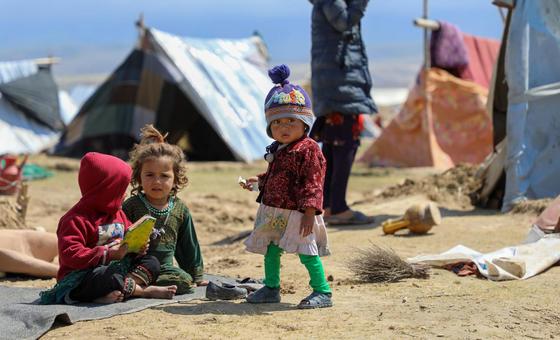Briefing ambassadors, the new UN Special Representative in Afghanistan and UNAMA chief, Roza Otunbayeva, highlighted ongoing political and human rights concerns – as well as several positive developments – since the Taliban’s seizure of power in August 2021.
“We do not see eye to eye with the Taliban on a number of issues, but the focus is, and should be, on maintaining dialogue in the hope of a better future for Afghanistan, where everyone – women, men, girls and boys – can live a life with dignity and equality,” she said.
Living in misery
Ms. Otunbayeva took up her position in September and has travelled throughout Afghanistan since then.
“What struck me most was the misery of so many Afghans who live in great poverty and uncertainty. Many told me during my visits around the country that they are simply surviving,” she said.
While the Taliban are essentially in control, they are unable to satisfactorily address terrorist groups operating there, she reported. Recently, the Islamic State – Khorasan Province (ISKP), an affiliate of the extremist terrorist group known as Daesh, carried out attacks against the Russian and Pakistani embassies, and a hotel hosting many Chinese nationals.
The Taliban now face little domestic opposition, and have rejected the need for intra-Afghan dialogue, though the UN continues to push for wider consultation as well as representation.
Women’s lives restricted
The de facto authorities have continued to implement harsh social policies, including a slew of decrees that have been harmful to women, restricting them in both the social and political spheres.
“The prevention of secondary education will mean that in two years there will be no girls entering into university. This decision is extremely unpopular among Afghans and even within the Taliban leadership,” said Ms. Otunbayeva.
Last month, Taliban leader Haibatullah Akhunzada ordered judges to implement capital and corporal punishment where applicable under Sharia law.
While sentences have been carried out since the takeover, the first public execution took place earlier on 7 December, attended by senior officials.
The envoy said she had stressed to the de facto authorities that the death penalty is incompatible with international human rights law.
“It is clear that there are severe differences of positions on a range of issues between UNAMA and the de facto authorities,” she added.

Women and children have been the most impacted by the current humanitarian crisis in Afghanistan.
Record export revenue
Ms. Otunbayeva also reported on several positive developments in Afghanistan, particularly on the economic front.
Overall corruption levels are “significantly down” compared to the democratically elected government in place before the takeover, but there are signs of an uptick in petty corruption at the local level over the past six months, she said.
The Taliban also announced that more fiscal revenues were collected in the first 10 months of 2022 than in the previous two years, and despite a 20 per cent economic contraction in 2021.
“With these revenues, and by reducing the costs of government, the Taliban have managed to finance their operational budget and have indicated they have resources to begin some development projects,” she said.
Furthermore, the Taliban have managed to maintain macroeconomic stability, and exports reached a historic $1.7 billion this year, compared to around $700 million previously.
Investing for autonomy
“The de facto authorities are implementing an economic strategy that focuses on self-reliance. They are investing in sectors such as agriculture, irrigation, infrastructure, water management, mining and industries, that provide a foundation for economic growth,” said Ms. Otunbayeva.
They also have identified the private sector as a key driver for growth, with the high cost of international financial transactions being the main barrier to greater investment.
There also is evidence that a ban on the cultivation of opium and other narcotics, announced in April, is being implemented. Fields planted before and after the declaration, have been destroyed.
“We will not be able to verify the actual implementation of this ban until early next year but the intention behind it is commendable,” she said. “Nonetheless, the ban will have a negative effect on the income of individual farmers as few alternative livelihood programmes were put in place.”

A thirteen-year-old girl studies at home in Kabul after the Taliban announced that schools would not reopen for Afghan girls in grades 7-12.
Address Afghan concerns
Ms. Otunbayeva warned, however, that these economic developments might not be sustainable if the real concerns of Afghans are not addressed.
UNAMA recently convened stakeholder meetings in 12 provinces. More than 500 people took part, including 189 women and over 80 Taliban representatives.
People expressed concern over issues such as the ban on girls’ education, lack of health facilities, mental health, poverty, economic insecurity and discrimination against ethnic minorities.
Afghans are also frustrated with the international community’s approach, she added. They want projects that are more-long term, involve cash-for-work rather than handouts, and which are more participatory, consultative and development-oriented.
“Under current conditions, however, donors are increasingly unwilling to look beyond the provision of humanitarian assistance,” she said.
“As long as girls remain excluded from school and the de facto authorities continue to disregard other stated concerns of the international community, we remain at something of an impasse.”

